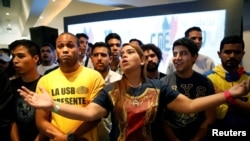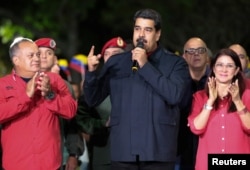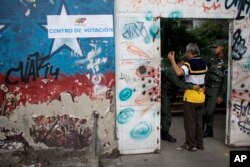Venezuela's opposition coalition has rejected the results of Sunday's gubernatorial elections, in which the ruling Socialist Party won at least 17 of the country’s 23 states.
"We do not recognize any of the results at this time. We are facing a very serious moment for the country," said Gerardo Blyde, campaign director for the Democratic Union Roundtable (Mesa de la Unidad Democratica, or MUD). He called for a full audit of the results.
The opposition, which had been predicted to take at least half the seats, held control in just five states. Results were pending Monday in Bolivar, a state in the country’s east.
President Nicolas Maduro, 54, hailed the results as a win for "Chavismo," referring to the movement’s name for his predecessor, Hugo Chavez.
"Today, Chavism devastated" the opposition, he exulted in a televised speech Sunday from the presidential palace. "… Chavismo is alive, is on the street and is triumphant."
Maduro says voter turnout was a relatively high 61 percent, and he later tweeted that "the Venezuelan people have achieved the triumph of peace and democracy through the vote."
The United States applauds what the State Department calls the "courage, determination and the will of the Venezuelan people who tried to endorse their constitutional rights" by voting.
However, it says, their voice was not heard, as the election was neither free nor fair. It is spelling out a list of election irregularities, including a lack of independent credible observers, no announcement of last minute changes to polling place locations, manipulation of ballot layouts, a shortage of voting machines on pro-opposition neighborhoods, and a lack of a technical audit in the way the election council counts the votes.
The MUD opposition was unable to hold control of central Miranda state, which includes part of the capital city, Caracas. Opposition leader and former presidential candidate Henrique Capriles was Miranda governor for nine years. The Maduro government had banned Capriles from seeking public office again.
When he went to vote Sunday, Capriles urged other Venezuelans to get past obstacles and cast their votes. He urged these "soldiers of the homeland to defend the sovereignty of the people."
Before Sunday’s vote, analysts had predicted losses for candidates of the government, which people blame for the severe economic crisis facing the oil-rich country.
Some journalists trying to cover voting were barred from entering polling places, even though they held accreditation, the National Union of Press Workers of Venezuela (SNTP) complained in a tweet.
The Venezuelan Penal Forum, a nongovernment organization, reported 32 detainees during the electoral process.
Maduro has said that governors, who have four-year terms, will report to the Constituent Assembly, a powerful super-congress made up of his supporters. Its 545 members, who include his wife and son, were chosen in a July election boycotted by the opposition and widely denounced as fraudulent. Shortly afterward, the United States imposed sanctions on Maduro and members of his inner circle.
The U.S. and European Union are considering additional sanctions against the Maduro government.
VOA's Kenneth Schwartz contributed to this report.






